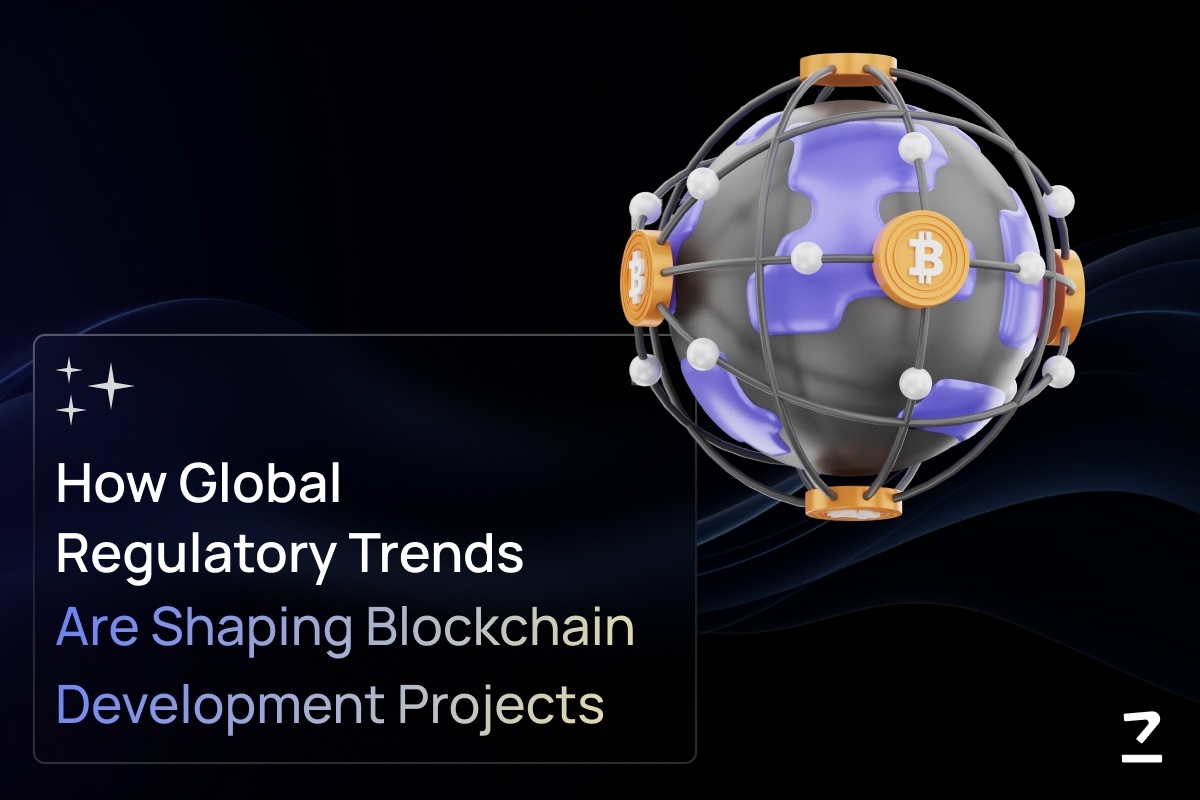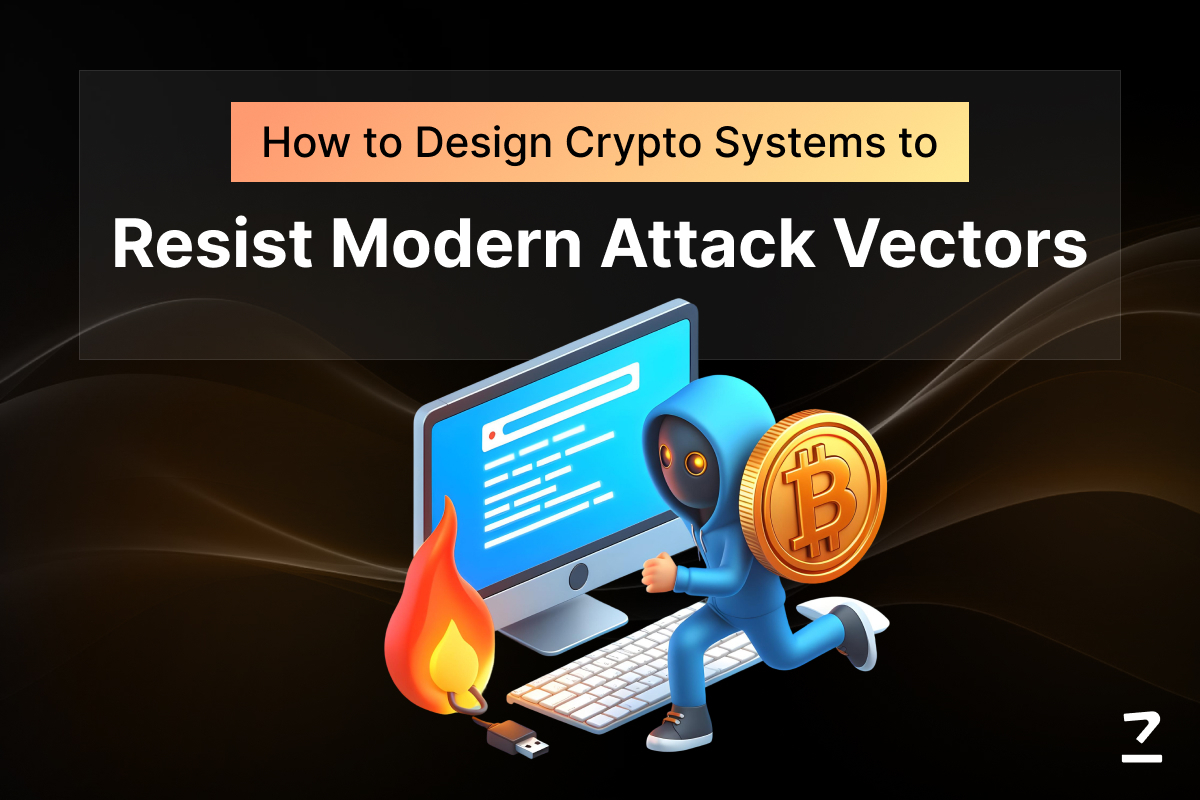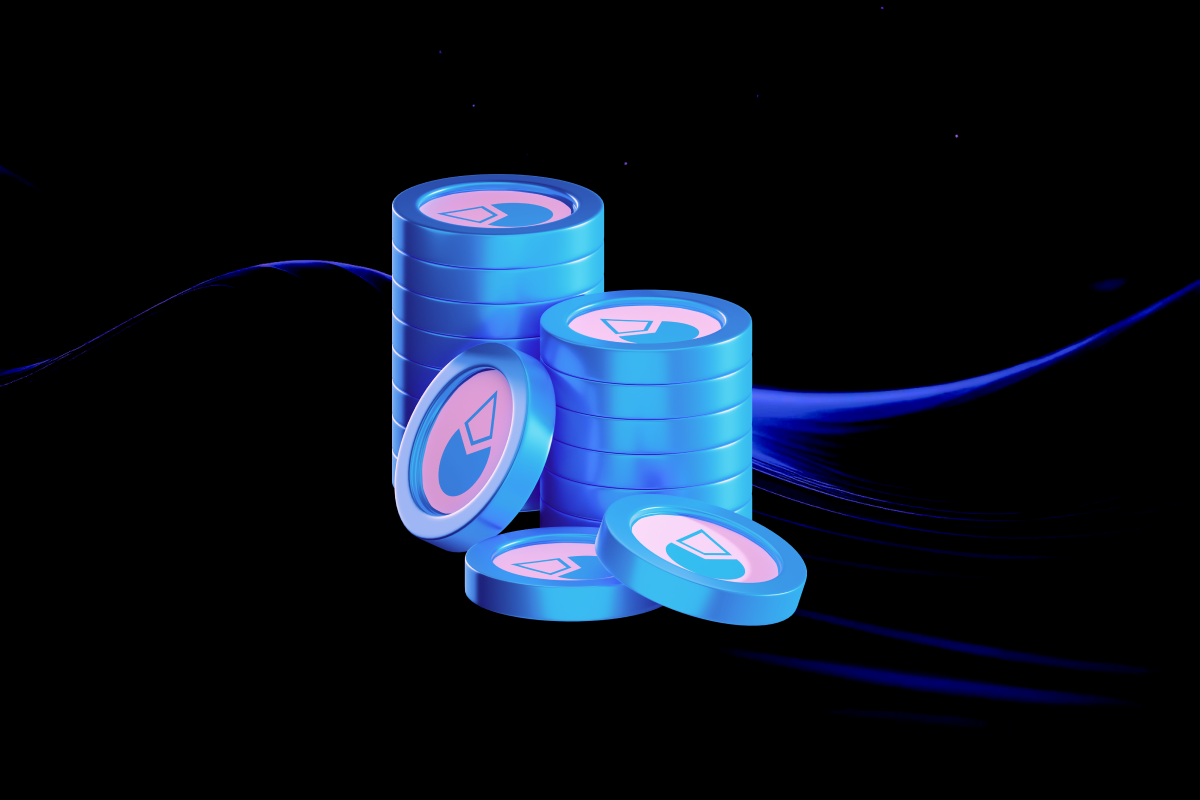SHARE THIS ARTICLE
Play-to-Earn Revolution: Building Sustainable Gaming Economies Post-Axie Infinity

The past year has witnessed a surge in the popularity of Play-to-Earn (P2E) games. These games revolutionize the traditional gaming model by rewarding players with cryptocurrency or other digital assets for their time and skill invested within the game world. Axie Infinity, a monster-battling game built on blockchain technology, stands as a prime example of this phenomenon. By allowing players to own, breed, and battle adorable creatures called Axies, Axie Infinity captured the imagination of gamers worldwide and introduced many to the exciting possibilities of P2E.
However, despite the initial success stories, the current P2E space faces some limitations. Issues like unsustainable tokenomics, where excessive token creation can lead to inflation and devaluation of in-game currencies, can hinder the long-term viability of these games. Additionally, the high cost of entry, often requiring players to purchase expensive NFTs (non-fungible tokens) to participate, can create barriers for many.
While these challenges are undeniable, they shouldn't overshadow the immense potential of P2E. We believe Play-to-Earn can evolve beyond a mere gaming trend. By adopting sustainable economic models and nurturing empowered communities, P2E has the potential to create a future where gamers can not only enjoy their favorite pastime but also derive real economic value from their participation.
The Problems with the Current Play-to-Earn Model
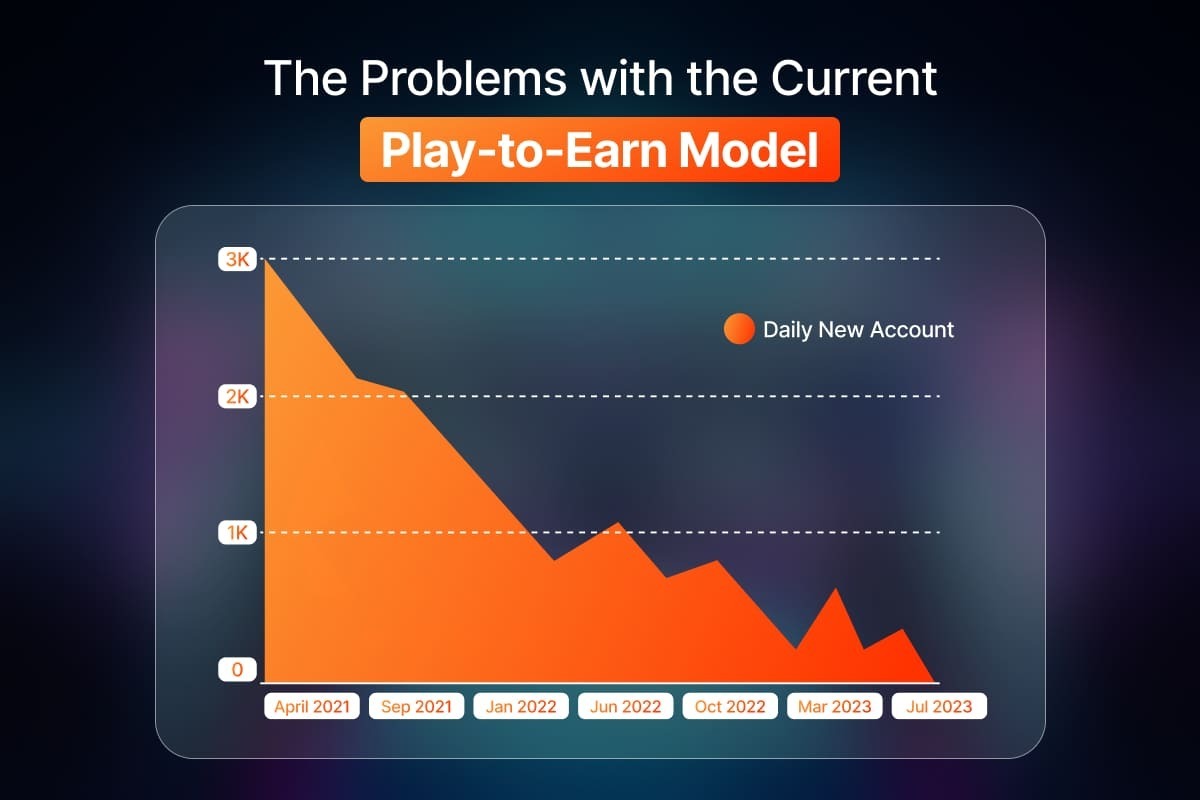 While P2E offers exciting possibilities, the current generation of games grapples with some significant hurdles. One major challenge lies in the following:
While P2E offers exciting possibilities, the current generation of games grapples with some significant hurdles. One major challenge lies in the following:
Unsustainable Tokenomics
Tokenomics refers to the design and management of a game's in-game currency or token. It considers factors like supply (how many tokens exist), demand (how players use and value them), and utility (what players can do with them within the game). A well-designed token should have a limited supply, leading to scarcity and value. Additionally, the token should have clear utility within the game world, such as purchasing in-game items, breeding digital assets, or participating in governance decisions.
However, poorly designed tokenomics can lead to a situation where the supply of in-game currency outpaces its demand, causing inflation and devaluation. For instance, suppose in a game where developers constantly mint new tokens to reward players. However, there aren't enough avenues for players to spend them within the game. This excess supply drives down the token's value, making it less attractive for players and potentially harming the game's economy.
A prime example of this is CryptoKitties. This pioneering NFT game, launched in 2017, is considered one of the early movers in the play-to-earn space. However, the game's tokenomics suffered from excessive breeding mechanics, leading to an oversupply of CryptoKitty NFTs and a decline in the value of the game's currency, effectively hindering the game's long-term sustainability.
High Entry Barriers
Another major roadblock for P2E is the presence of high entry barriers. Many P2E games require players to purchase NFTs, which can be quite expensive, to participate meaningfully. This creates an uneven playing field where players with larger initial investments have a distinct advantage. For instance, a monster-battling game might require players to own specific NFT creatures to compete at higher levels. This high upfront cost can deter casual gamers and hinder the game's wider adoption.
Limited Gameplay Focus
Furthermore, some P2E games prioritize earning mechanics over creating engaging gameplay experiences. The focus becomes grinding for rewards, neglecting the actual fun and enjoyment of playing the game. This approach can lead to player churn, where players quickly lose interest after achieving their initial earning goals. For a P2E game to be truly sustainable, it needs to strike a balance between rewarding players for their time and effort while offering a genuinely enjoyable and engaging experience.
Building Sustainable Economies with P2E
The future of P2E lies not just in short-term gains but in developing sustainable economies that prioritize long-term value for players and communities. This requires a shift in focus from maximizing immediate token rewards to creating engaging gameplay experiences and creating a strong sense of community within the game world. Players should feel a sense of accomplishment beyond just earning tokens, whether it's mastering the game's mechanics, building a strong character, or working collaboratively with others towards a common goal.
Evolving Tokenomics
Evolving tokenomics plays a crucial role in achieving this sustainability. One exciting development driving this shift is the integration of DeFi solutions within P2E games. DeFi tools like staking and lending/borrowing can create new revenue streams for players. For example, players could stake their in-game tokens to earn interest, essentially putting their assets to work while they play. Similarly, lending mechanics could allow players to earn rewards by loaning their in-game assets to others. These DeFi integrations contribute to a more sustainable token economy by increasing the utility and overall demand for in-game currencies.
NFT Creation and Utility
NFTs (non-fungible tokens) play a crucial role in P2E games, often representing in-game assets, characters, or unique items. However, the concept of NFTs is evolving beyond simple ownership. Utility NFTs are gaining traction, offering players ongoing benefits within the game ecosystem. For instance, consider an NFT weapon that not only represents ownership but also grants the player bonus attack power or access to exclusive areas. This adds a layer of strategic depth and incentivizes players to hold onto their NFTs for long-term value. Tech companies specializing in NFT Creation Services can help game developers design unique and valuable utility NFTs that enhance the overall gameplay experience.
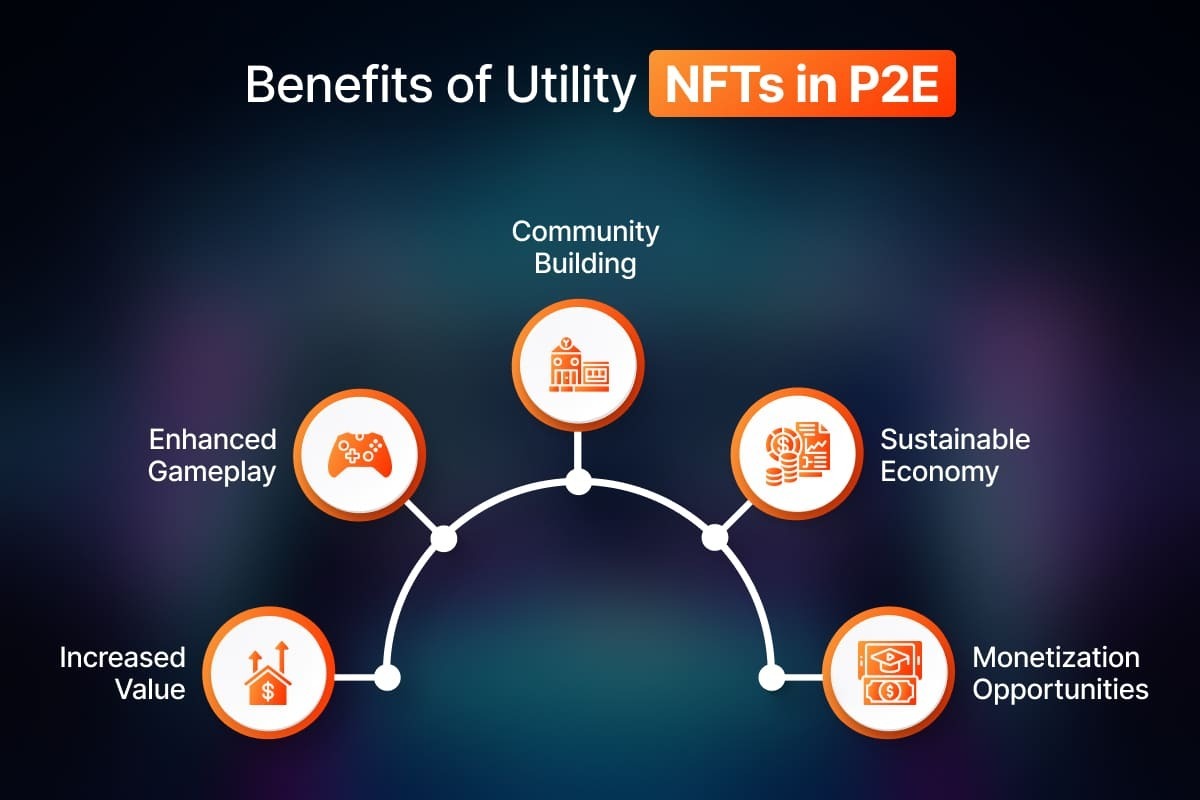
Focus on Community Ownership
Taking community engagement a step further, the concept of Decentralized Autonomous Organizations (DAOs) can revolutionize P2E governance. DAOs are essentially communities operating on blockchain technology, allowing members to collectively make decisions. In the context of P2E, DAOs can allow players to have a say in the game's development, from proposing rule changes to shaping the in-game economy. This creates a sense of ownership and incentivizes players to be invested in the game's long-term success.
Engaging Gameplay Experiences
At the heart of any successful game lies engaging gameplay. P2E games are no exception. A sustainable P2E model needs to strike a balance between rewarding players and offering a genuinely fun and engaging experience. Games that prioritize grinding for tokens over creating a captivating world and enjoyable mechanics will struggle to retain players in the long run.
A prime example of a P2E game that balances enjoyment with earning potential is The Sandbox. This open-world voxel game allows players to create, build, and monetize their own experiences within the game world. Players can own land as NFTs, design interactive games, and even charge other players for access. This creates a vibrant player-driven economy where creativity and skillful gameplay are rewarded.
Sustainable Tokenomics Design
Well-designed tokenomics are the backbone of a healthy P2E economy. Sustainable tokenomics focuses on creating a balance between supply and demand for in-game tokens, ensuring their long-term value. Mechanisms like token burning can help regulate supply by permanently removing tokens from circulation. Additionally, well-defined play-to-earn ratios ensure players are adequately rewarded for their time and effort without causing inflation.
Crypto Exchange Services
Integration with crypto exchange services is essential for a thriving P2E ecosystem. Players need a secure and user-friendly platform to easily buy, sell, and trade their in-game currencies. Frictionless transactions are crucial for facilitating a healthy in-game economy and ensuring players can enjoy the play-to-earn aspect without unnecessary hurdles.
By addressing these key areas – engaging gameplay, innovative DeFi integration, valuable NFTs, and smooth exchange services – P2E games can evolve towards building sustainable economies that benefit both developers and players in the long run.
The Social Impact of Sustainable P2E
The potential of P2E is not limited to in-game economies and token values. Sustainable P2E models have the power to empower gaming communities in profound ways.
Play-to-Earn as a Source of Income
For gamers in regions with limited job opportunities, sustainable P2E games can offer a legitimate path to generating income. By skillfully playing the game, completing quests, and participating in the in-game economy, players can earn tokens or NFTs that have real-world value. These digital assets can be traded on cryptocurrency exchanges or marketplaces, potentially translating into a steady income stream. This is particularly significant for players in developing countries where traditional employment opportunities might be scarce. P2E games can provide a valuable source of income, promoting financial inclusion and empowering individuals to contribute to the global digital economy.
Facilitating Community Ownership
As discussed earlier, DAOs and Player-Owned Economies (POEs) can revolutionize how gaming communities operate. By giving players a say in the game's development and governance, these models create a sense of ownership and shared responsibility for the game's success. Players can propose rule changes, vote on critical decisions, and actively shape the future of the game world they inhabit. This leads to a more collaborative and engaged community, where players feel invested in the long-term health of the game.
Addressing Challenges
While the potential of P2E is undeniable, some hurdles need to be addressed to ensure its widespread adoption. One key concern is scalability and mainstream adoption. Currently, many P2E games struggle to accommodate a large player base, leading to issues like server congestion and transaction delays. As the industry matures, developers need to focus on creating scalable infrastructure that can support a growing user base.
Furthermore, regulations and legal considerations surrounding P2E games are also evolving at a rapid pace. Governments worldwide are still grappling with how to classify and regulate in-game assets and digital currencies. Clear and consistent regulations are necessary to ensure a safe and secure environment for both players and developers.
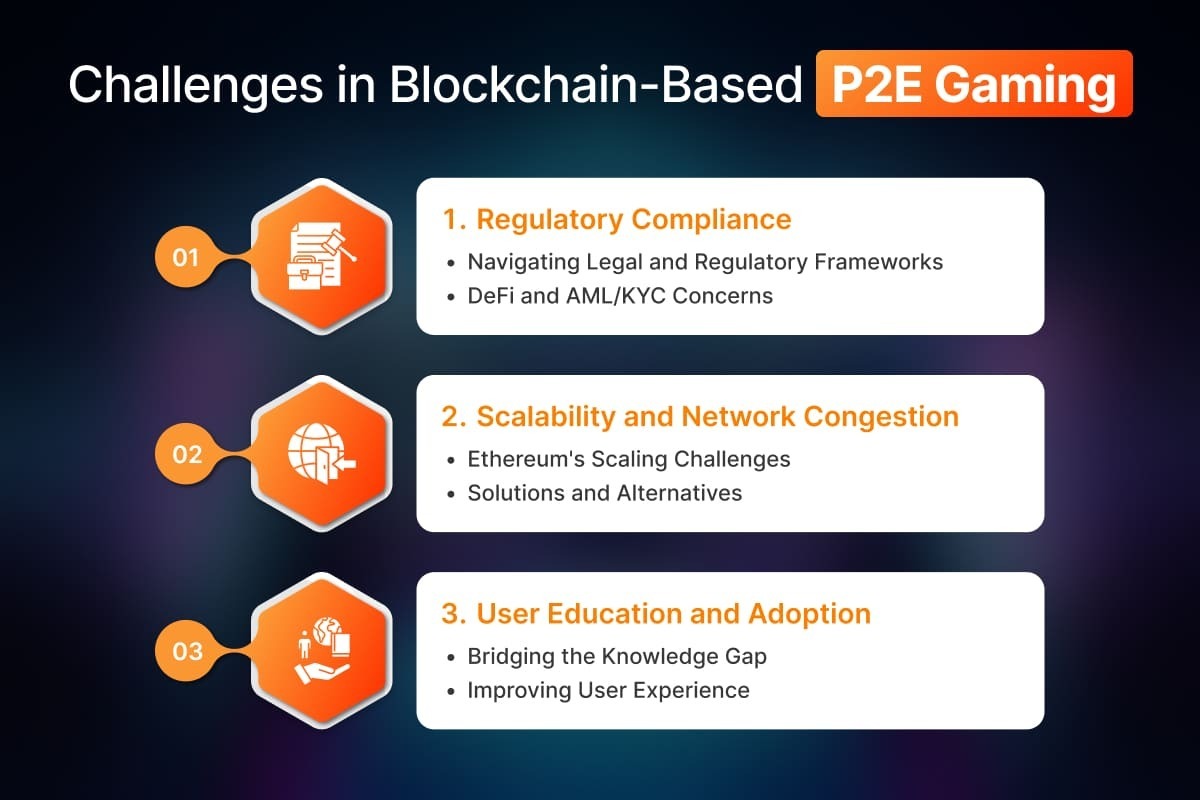
Examples of P2E Games with Sustainable Economies
The concept of sustainable P2E models isn't just theoretical. Several games are already pioneering innovative approaches that prioritize community, engaging gameplay, and long-term value creation. Here are a couple of examples.
The Sandbox (SAND)
This open-world voxel metaverse allows players to create, build, and monetize their own experiences within the game. The SAND token serves as the foundation of the in-game economy, with multiple use cases. Players can use SAND to purchase land parcels (represented as NFTs) and participate in governance decisions through the SAND DAO (Decentralized Autonomous Organization).
Approach
The Sandbox takes a unique approach to P2E by focusing on player-driven creation and ownership. Players own virtual land plots as NFTs within the game's vast open world. These plots can be customized, used to build experiences like games and interactive environments, and even monetized by charging other players for access.
Impact
This model promotes a vibrant player-driven economy. Skilled creators can earn income through their creations, while players can enjoy a diverse range of user-generated content and experiences. The SAND token, used for transactions within the game, has multiple utilities, including purchasing land, assets, and participating in governance decisions. This diverse use case helps maintain the token's value and creates a more sustainable economic ecosystem.
Guild of Guardians (GOG)
This mobile RPG with a focus on tactical combat and monster collection boasts a well-designed tokenomics model. The game features two primary tokens: GEMS and GGG. GEMS are the primary in-game currency, earned through gameplay and used for activities like upgrading characters and purchasing items. However, GEMS have a capped supply, preventing inflation.
GGG tokens, on the other hand, function as governance tokens. By holding GGG, players gain voting rights within the Guardians Guild DAO, allowing them to influence decisions regarding game development, resource allocation, and future features. This community-driven approach fosters a sense of ownership and incentivizes players to be invested in the game's long-term success.
Approach
Guild of Guardians takes a community-centric approach to P2E, focusing on developing a strong and engaged player base. The game features strategic turn-based combat with a focus on building and collecting unique NFT heroes.
Impact
The P2E game prioritizes fair play and long-term value for players. This utilizes a scholarship system, allowing players who don't own NFTs to borrow them from others and share the rewards. This leads to a more inclusive economy and allows new players to participate in the P2E aspects of the game. Additionally, GOG incorporates a "soulbound" token system, where certain in-game items are permanently linked to a player's account. This discourages inflation and incentivizes players to invest in their characters for long-term success.
Conclusion:
While the initial wave of P2E games faced several challenges, the future is bright for models that prioritize long-term value and community empowerment. Furthermore, the positive social and economic impact of P2E is undeniable, as it provides new avenues for income generation. Additionally, these models can facilitate a more collaborative and engaged gaming experience, where players have a say in the game's future.
At Codezeros, we are excited to be at the forefront of building the future of P2E. Our suite of services aids developers in creating sustainable and engaging P2E experiences. We believe P2E has the potential to redefine the gaming industry, and we invite developers and gamers alike to join us in exploring the exciting possibilities that lie ahead. Let's work together to build a future of P2E that benefits players, developers, and the global gaming community as a whole.
Post Author
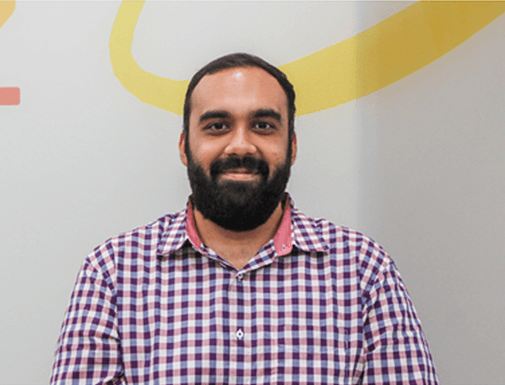
As a distinguished blockchain expert at Codezeros, Paritosh contributes to the company's growth by leveraging his expertise in the field. His forward-thinking mindset and deep industry knowledge position Codezeros at the forefront of blockchain advancements.
Build a Play-to-Earn application with a sustainable economy.
Blockchain-based play-to-earn games have a notable social impact. At Codezeros, we can help you leverage this opportunity by helping you build one with a sustainable economy while upholding engaging gameplay.

